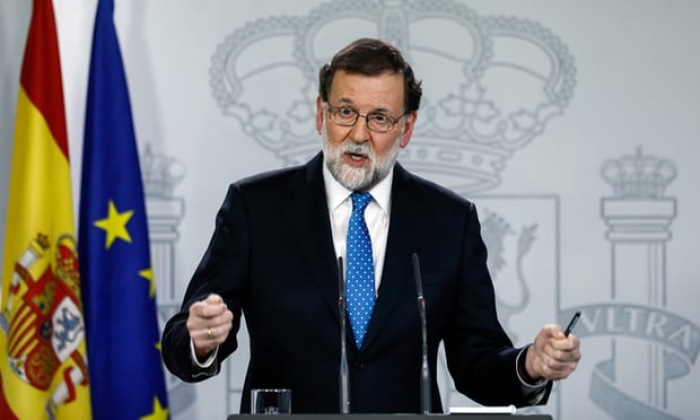Asked whether he accepted responsibility for the disastrous poll showing of his conservative People’s party, whose presence in the Catalan parliament was reduced from 11 seats to three, Rajoy replied: “The prime minister accepts responsibility for anything that happens to the People’s party, just as all members of the People’s party across Spain do.”
He shrugged off suggestions that his use of article 155 of the Spanish constitution to suspend Catalan autonomy had proved costly and counterproductive.
“I think article 155 was applied as it needed to be,” he said. “It was not applied when the Catalan government took the first of its decisions that were against the law. We were prudent. It was applied with the agreement of an enormous majority in the senate and it was applied intelligently.”
He pointed out that the centre-right Citizens party, which strongly supported his actions, won the largest share of the Catalan vote and the greatest number of seats.
“The negative thing about these results, from my point of view, is that those of us who wanted change haven’t won enough seats to bring that to a successful conclusion,” he said at a press conference in Madrid.
He said the separatist bloc had lost two seats since the last regional election and had taken a combined 47.6% of the vote, and thus could not claim to represent all Catalans.
“Yesterday’s results also make it plain that no one can speak for Catalonia who doesn’t include all of Catalonia,” Rajoy said. “What’s clear after the vote is that Catalonia is not monolithic; Catalonia is plural and we all need to nurture that plurality as a virtue and a source or riches.”
With speculation mounting that Together for Catalonia, the party of the deposed Catalan president, Carles Puigdemont, will attempt to reassemble its previous coalition with the Catalan Republican Left party (ERC) and the anti-capitalist Popular Unity Candidacy, Rajoy called for a new direction in Catalan politics.
“Elections always offer the possibility of a new democratic beginning, an opportunity to embark on a new phase,” he said. “I trust that from now, Catalonia will enter a phase based on dialogue and not confrontation, in cooperation and not imposition, in plurality and not unilateralism.”
He said the Spanish government would be prepared to collaborate with any Catalan government that observed the law and worked to restore stability, security and social harmony to the region.
“Without respect for the law, and without a responsible Catalan government that respects it, it won’t be possible to guarantee security and certainty,” he said.
Earlier on Friday, Puigdemont, who fled to Brussels at the end of October, said he was ready to meet Rajoy to find a way out of the crisis, but stipulated that the meeting could not take place in Spain, where he faces arrest on possible charges of sedition, rebellion and misuse of public funds.
“I am willing to meet Mr Rajoy in Brussels or in any other location in the EU, so long as it is not in the Spanish state, for obvious reasons,” he said. “Catalonia wants to be an independent state, but the next step is to talk with Mariano Rajoy.”
Calling the election results a “slap in the face” for Rajoy, Puigdemont said: “We must completely change the recipe because it doesn’t work any more.”
He said Rajoy’s strategy of taking control of the region to try to head off the independence movement had failed. “All I ask is that he listens to us,” he said. “We have the right to restore that which the Spanish government changed so abruptly.”
Rajoy gave short shrift to Puigdemont’s offer, pointedly saying the leader he should meet was Inés Arrimadas, of the Catalan Citizens party, which won 37 seats and 25.4% of the vote.
“The person I need to sit down with is the person who won the election and that’s Arrimadas,” he said.
He refused to speculate on whether Puigdemont’s legal situation could complicate his return to the Catalan presidency, saying it was a matter for the courts.
Madrid’s direct rule over Catalonia is due to expire when a new Catalan government is formed. Pressed on whether article 155 could be used if the next regional administration pushed on with a unilateral quest for independence, Rajoy said he would not focus on the “worst possible situation” but added that the law had to be obeyed.
Despite the political upheaval, Barcelona was calm on Friday morning, with people finishing off their Christmas shopping or sitting glued to the TV to find out how they had fared in the annual Christmas lottery, El Gordo.
The coming weeks will see a return to the politicking as coalition talks begin, Puigdemont and his allies seek a return to power and the Spanish government looks on and weighs up its options.
More about: #Catalan-crisis
















































